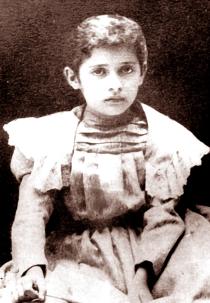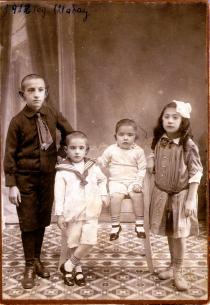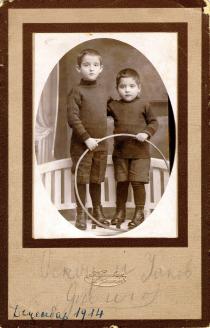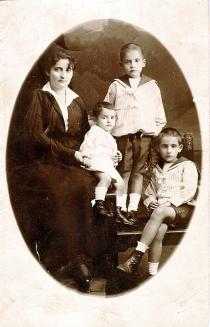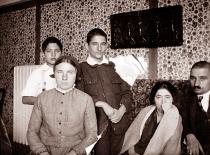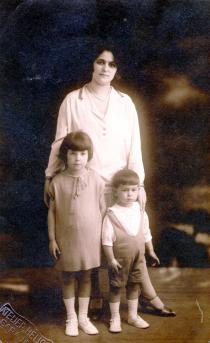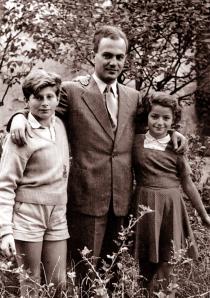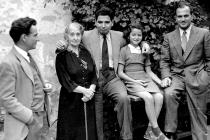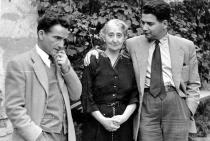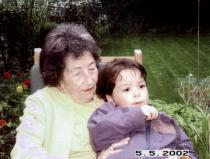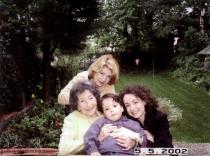
Buena Bonka Davico
Belgrade, Yugoslavia
Interviewer: Ida Haider-Labudovic
- My family background
My name is Buena Bonka Davico. They call me Bonka now, because after WWII I changed my first name. My grandmother and every one else in the family called me Bonka. I didn’t like the name Buena and I officially changed it to Bonka in the municipality office.
I’ve never met my father’s parents, because my grandmother died young from Spanish fever and left three sons and a daughter. I didn’t get to meet grandfather either, as he died before I was born. Their graves are among the oldest in the Jewish Cemetery in Belgrade.
My grandparents on my mother’s side, Avram Papo and Mazalta Papo (nee Sumbul), and my mother Estera too, were all born in Sarajevo, as was my uncle Isak. At that time it was the Austro-Hungarian Monarchy. In 1928, everyone moved to Vienna.
My (maternal) uncle was interested to know about our family roots, and on one occasion he went to Spain where he found out, he wasn’t sure how, that our family originally came from a village near Toledo before 1492, when the Jews were exiled from Spain.
Grandfather Jacob had a liqueur and wine factory near Alipasha’s Bridge. Although we lived downtown, my grandmother Mazalta had a summer cottage and a little field, and as I loved animals very much, we used to go to that field on Saturdays and Sundays and I played with the animals. Grandmother had all kinds of animals.
My grandparents dressed in a very modern fashion. Grandmother loved to dress nicely and had her clothes made at famous tailors’ shops, she never wore a tokado (Editor’s note: cap worn by Sephardi women made of silk or brocade), and as I recall, grandfather was dressed in European-style clothes (that is, he was fashionably dressed).
They strongly insisted on Jewish holidays, especially my grandmother. For Sabbath we, as well as her other daughter, were all at her house. I can’t remember exactly what Sabbath was like, because we, my parents, my brother and I, moved to Belgrade when I was 6.
My grandmother Mazalta had three sisters (Saphira, Rifka and aunt Altarac) and four brothers (Isidor, Samuel, Joseph and Moritz). My uncle Isidor never married, he adored his sisters, none of whom lived in Belgrade besides aunt Rifka (and later grandmother Mazalta). Saphira lived in Banja Luka, and aunt Altarac in Sarajevo.
He made so-called Sumbuliads and those were very interesting events. He invited all of his sisters and their children, without their husbands, to have fun in Belgrade. He was their host for ten days, he organized wonderful field trips and singing nights; Jewish and Serbian singers would come and sing Jewish and Serbian songs. Aunt Rifka’s son was good at organizing these evenings and he was the master of ceremony. For me, as a girl, those were the most wonderful days, those Sumbuliads.
(Editor’s note: from the family of Bonka’s maternal grandmother Mazalta, comes the famous architect Samuel Sumbul. He designed the building, where the head office of Jewish humanitarian societies Oneg Sabbath and Gemilot Hesedim was located.
- During the war and growing up
The building was built in 1923, it belonged to the Jewish Municipal Hall and it represented the cultural and social center in Belgrade. The story of that building and this part of Belgrade is a journey through time and a memory of old Dorcol).
My father was a merchant. As a young man he was drafted into the army and took part in the Balkan wars, he fought in Albania, too. In 1918, he went (from Albania) to Sarajevo. There were five Jews in that regiment, and one of them was my father.
They were greeted at the station by the (Jewish) “Benevolence Society”, of which my mother was a member, as well as by other Serbian societies. My father met my mother then, fell in love and the final outcome was that he wanted to stay in Sarajevo and get married.
However, my grandfather, my mother’s father, wouldn’t allow the wedding to take place at first because my father wanted to leave for Belgrade at once, so grandfather said they could be married only in condition they stayed in Sarajevo. Mother and father were married in 1919, I was born in 1920 , and my brother was born in 1923.
In 1926 we moved to Belgrade. At first we lived in Vuka Karadzica St. That’s in the downtown Belgrade, where we had a cosy four-bedroom apartment. My father started working, I can’t remember which job exactly, but it was not in the Riunione asiguracioni insurance company where he worked afterwards, he was a tradesman. Mother was a real homemaker; she kept the house and looked after us.
As for Jewish holidays I must say father wasn’t very religious, while mother was, because of her mother, and grandmother Mazalta. We didn’t keep Sabbath at our house, but at my father’s cousin, Rezinka Handel, Sabbath was observed. It was in Jovanova St. She was married to a very appealing man Julius Handel and it was a known fact that we were there every Friday for dinner.
We often had pechugas and pachas, smoked goose meat. Aunt Rezinka made extraordinary cracklings that my father adored, of course made out of goose meat, not pork. Their son Arthur Handel, who married the daughter of the famous Rabbi Isaac Alkalaj of the Jewish Community of Belgrade, was there as well. We went to aunt Rezinka’s for Sabbath until the year 1941.
Apart from that we celebrated two holidays, a very strict custom, Yom Kippur and Rosh Hashanah. Father would be fasting, just like mother, and I should have been fasting as well, but I cheated sometimes, because I liked to eat. In the evenings there was a service at the temple, in Cara Urosa St. We used to go there.
The Germans destroyed that synagogue and now the Museum of Frescoes is there. Father was in a row with a friend, I don’t know why, but following an old Jewish custom he came up to him and said that on Yom Kippur everybody made peace: I forgive you, you forgive me. It stuck with me that everything should be forgiven and peace made on Yom Kippur.
After fasting, large dinner parties were at our house. A lot of people would come. By that time my aunt Clara, mother’s sister from Sarajevo, had moved with her husband, uncle Isidor was there as well, my grandmother and her brother and we were all at that big dinner which would begin after the great fast with white coffee and ring-cake kugloff.
After about half an hour, so we wouldn’t be sick, the real dinner with chowder and everything else would begin, because that was the custom after a whole day of starving. Apart from that, I remember one more thing, but I don’t know what it’s called, when cocks and chickens are turned around everyone’s heads.
Mother would buy both cocks and chickens and father would, with the kippah on his head, whirl circle those hens around our heads for good luck and health. It was done on Rosh Hashanah. (Editor’s note: the interviewee is referring to the custom of Kapparot).
My entire schooling since the first grade of primary school was in the famous Kralja Petra school, which is a lovely establishment (and is one of the oldest schools in Belgrade). My father and his father attended the same school. During his father's schooling, it was composed of solely two huts.
I haven’t seen them, my father told me about it, and also that the school was built only later. Father also studied in one of those huts for a while. When we came from Sarayevo to Belgrade I went to first grade in “Kralja Petra” school located near our appartment in Vuka Karadzica St. and I finished four grades there.
After that I went to high school, to the famous “Kraljica Marija” school, which was just opened – it was a splendid high school in Narodnog Fronta St. - and there I completed eight grades. After that I attended a graduation the matriculation course, because my father insisted. I failed, I flunked one of the subjects and had to take it again in September.
I wanted to enroll in the University and I enrolled in the Law School because of my two best Serbian friends. Father at once turned into a strict Jew and was horrified at the thought that I might marry a non-Jew. He constantly chose boyfriends for me and always brought a cousin of mine, his sister’s son, to take me to the Jewish Municipal Hall in order for me to fall in love with a Jew.
Finally, when I did fall in love with a Jew, dad didn’t like him because he was a communist and so he confined me to the house and wouldn’t let me out. He was very strict about it. Only after my sister’s mother-in-law, aunt Rhea, a prominent, rich Belgrade Jewess, pleaded and insisted that he was a very fine young man, did father agree and I received permission to marry him.
About my husband’s family; my husband Jasha Davico comes from one of the oldest (Sephardi) families in Serbia, there is only one family with that last name. On how they got the last name Davico; one of their 19th century ancestors was called Hajim David, family stories say that prince Milos Obrenovic liked him very much and changed his surname to Davidce, that’s where Davico comes from.
In literature the name of Haim Davico, whom Prince M. Obrenovic appointed as his purveyor, is often mentioned. Haim Behor David, as was his full name, was simultaneously a trustee of the Turkish Vezir and of the Serbian Prince. When the Turkish Vezir Jusuf Pasha invited Prince Milos to negotiations, with the intention of killing him, Haim Davico knew this and saved his life.
Afterwards he was in exile in Vienna untill 1859. The brothers H. Davico owned a storage yard in the 19th century, the proof of which is an advertisement from the Belgrade Daily Journal from 1885. The story teller and translator Hajim S. Davico was born in Belgrade 1854, and his stories abound in ethnographic data. The book of stories “Sa Jalije” (from Jalija is famous).
It is a very old family with many famous members. One of them is Benko Davico, a colonel in the Serbian army who died during the Balkan war and whose wife was Streja Davico. They had three children; one of the sons was Lui Davico, after whom the ballet school in Belgrade received its name. Many Davicos are famous; two writers, statesmen... All were left-leaning.
My husband had two brothers: Oskar and Mirko. When my husband was 14 his mother died. My father-in-law Nisim was horribly miserable when his wife died. He was the poorest of all the brothers and he didn’t know what to do with the children. My husband’s mother Rachel had four sisters, Nuca, Saruca-Sarah, Rhea and Sophia.
The aunts took the sons into her house. My husband lived with Luisa, who was Nisim’s brother’s wife. Oscar lived with Aunt Rhea, and Mirko with Aunt Sarah. (Today) Oskar is one of the most celebrated Serbian poets whose song “Srbija medju sljivama” (Serbia among the plums) is famous. I think it’s one of the most beautiful Serbian songs.
Jasha, my husband, was a journalist, he finished Law school. Later he became a legal consultant in a large factory in Pancevo. Mirko was a famous student and the organizer of student protests in the Faculty of Law. He was killed in Jasenovac (1). I had the last card he sent to my mother, because he was afraid to write to the Davicos. The card arrived from Jasenovac and it says that he was not so bad and that he didn’t know how long he would be there. After that he was killed.
I met Nisim, my father in law, when my husband and I were already engaged, but in October 1940 Nisim died and the wedding was already arranged. So we postponed it for a month and were married on the December 1st instead of November.
When I passed the first two exams (in the Law School) - and I could have passed many more had I not been lazy - the war began and my father who was an officer and a Reserve Lieutenant left for Zagreb. We had a coup d’éetat on March 27th 1941, when everyone went to the streets shouting, “Better war than pact”.
The next day father went to Zagreb, where his commander was and said that the war was about to begin, that the Croats were ready to become independent from Yugoslavia and that he would like my mother, brother and I to leave for Montenegro.
He was very clever in saying that Montenegro would be completely occupied by Italians, because the Italian Queen, Regina Elena, the wife of Umberto I, was from Montenegro. She was the daughter of King Nikola, a beautiful woman. My brother, mother and I went, and my husband was at the front, towards the Bulgarian border in Stracin.
We left for Dubrovnik with the intention of continuing for Montenegro. Yugoslavia soon surrendered, my father was captured around April 15th in Sarajevo, but managed to escape and free himself. My grandfather was right when he said that he was an outlaw chieftain.
He escaped into the yard of a Muslim who was a friend of my aunt’s and that Muslim saved him, gave him the “Lascia passare”, a travel permit - he had some connections - gave him a Muslim outfit and a fez and my father came to Dubrovnik and he found us there.
We were in Dubrovnik until the Germans arrived and it became a complete madhouse. In 1941 father saw people carrying Ustasha (2) flags on the streets, he came to where we were staying and said that we had to leave. From Dubrovnik to Montenegro it is about 30-40 km.
Father found a taxi driver and he agreed to drive us there, but he left us, I don’t know, about 7-8 km from Montenegro, and we walked from there until we reached a village and from there to Petrovac na moru (Montenegro). My father, mother, brother and I were there, and my husband was still in Belgrade sweeping Kralja Milana St. as a forced laborer.
Then my father found a man, who had connections in Belgrade. Father gave him Napoleons (ducats) to bring my husband who stayed 15 days in Belgrade, where the Germans were, and he succeeded to get him to Petrovac na Moru.
On July 13th the first uprising against the fascists started in Montenegro. The first place was none other than Petrovac na moru, which was freed by the Camice Nere (3), the Black Shirts Camice Nere. The Italians received orders to move into the village and kill everybody because the people rebelled.
The Italians were otherwise extraordinarily noble and kind to the Jews, but the Camice Nere were fighting against the rebellious Montenegrin people, and as we were subletting a room in a private house with a Montenegrin, they lined us all against a wall with the intention of shooting us.
There were ten of us against that wall, my husband escaped into the woods, and there was another family, the Celebonovics, a woman and her son, Rade Petrovic, and the landlord with his wife and mother-in-law. We waited for two hours to be shot and get it over with.
The Italians returned and said they couldn’t kill anybody and after two hours in front of that wall they let us go. But they chained us, and me and Smilja Konstantinovic, the girlfriend of Celebonovic’s son’s girlfriend were ordered to serve food there. Everyone else was imprisoned. It lasted for 7-8 days, and then the two of us were also chained and and taken to a prison in Bar. It is a port in Montenegro. I was in prison for 4 months and 18 days. I caught fleas there, and an Italian slapped me on the face most dreadfully, I don’t know why, while waiting to get food.
My father, who was a great and capable man and a good organizer, again managed to bribe an Italian into letting us go, and so they did on condition that we went to Korcula (Island in Croatia). There were about 400 Jews interned there, from everywhere, Fredi Mosic was there also.
In Korcula the women had to report at the local council once a day, and the men three times. After ten days the women weren’t obliged to report anymore, and the men were obliged to do so only once a day. We were on Korcula for 4-5 months, until it occurred to my father that 2 km accross the sea there is the Ustashas tate.
Peljesac bay was there. And father again, through a Tenente, the man in charge, a very beautiful man who fell in love with a beautiful woman from Korcula Arneri Romana, managed to free us again. Through an Italian, father got permission for us all to be transferred to free territory in Italy, to a place called Borgo val di Taro. It is approximately 30-40 km from Parma.
It was a village that had never seen Jews before and the people couldn’t understand why were the Jews were persecuted. I have no words to describe how well they treated us. We all lived in private houses and when they found out that I was pregnant, every morning there was an egg, some fruit, a chicken on the doorstep, so that I would eat better.
I have no words for the Italians; we made friends with them. Zia Maria was in charge, she ran a hotel and had nephews, and our three young men who were there fell in love with the girls there. When the war ended and when everything was over my two cousins Leon Davico, Daki Levi and my brother, I believe, went to Borgo val di Taro to see how they lived and to thank them again, to remember those days when we lived there.
We left from Borgo val di Taro and went on a journey to which the final destination was London. But when we came to Rome from Borgo val di Taro, where we had no food, and the Jesuit priests saved us. The Jesuits lived in the Vatican, they had a special organization that helped everyone without discrimination, criminals and Jews as well, and they gave us a permit to go on.
My mother and father weren’t rescued from Rome as quickly as we were, only my husband and I left. First we went to Madrid, my daughter Svetlana was born there. From Madrid, with a two-month old daughter we started for Lisbon, because from there we could catch a plane to London.
On April 1st 1943, I arrived with my daughter and husband in London, by an English plane that flew from Lisbon to London. A week after that, that plane that flew once a week was shot down and the famous actor Howard that played in the movie “Gone with the Wind” died.
I arrived to London in the so-called “Patriotic School”. Again, it was a sort of a prison, very handsome for the women, because we were in a castle run by a woman officer, I don’t know what rank exactly, and the men were taken to a regular prison. Usually you’d be interrogated and wait there about 8-9 days, if everything was in order.
An Englishman who lived in Zagreb before the war and spoke excellent Croatian interrogated me. He knew about me more than I myself. He knew everything about me. He questioned me about my relative, the nephew of Aunt Rhea’s husband, who treated the Jews very badly because he took their money to transfer them to South America.
I hadn’t known that, I only found out about it after the war, from my mother and father. That officer, he was actually an agent, asked me if I had some pictures of coast at the “Patriotic School”. When I left Belgrade I took a small suitcase, I didn’t even carry a coat, it’s unbelievable, but I took three picture albums. And so I gave him five photos.
The most interesting part was that when I was leaving for Yugoslavia, in Southampton in 1945, I heard my name on the loud speaker being called to come to the office of that port. I went and they returned the five photos. Really, I get goose bumps just thinking about it now. They returned the photos after 2 years!
And so I boarded the ship in Southampton, arrived in Italy to Bari where was a reception center for our fighters. It was terrible because I came from London, had a child that was beautifully dressed, most elegantly, and there were poor, miserable and desperate fighters there. I could see that I shouldn’t stay there for long, and the ship was not going to leave soon. So I obtained another permit to go and live with some friends. The ship finally arrived and I left with my daughter. My husband wasn’t with us, he parachuted in 1944, I believe on Uzice, (Serbia), and joined the Partisans.
My mother, father and brother survived with the help of this Uziel Talvi, who was my Aunt Rhea’s cousin and who took their money. They got a permit to leave for Buenos Aires. I believe they left in the end of 1943. My brother was 18. They lived there until the end of their lives. In the beginning, my father had a pastry shop there that went bankrupt.
On one occasion he played bridge with a very rich Polish Jew who had owned a factory. That Pole, a young man, suffered from heart disease and he suggested to my father that he should work for him, and later he became a partner. It was a very famous cloth factory called Dego Tex.
My brother graduated in Buenos Aires and got a job in Dego Tex as a designer. He made cloth patterns that were superb. In the end they sold the plant in good time, because there was a great depression in Buenos Aires. My mother continued working, but in another factory, and father retired.
My mother died in Buenos Aires. Father died in Milan, leaving for Belgrade. He would come to Yugoslavia every other year because he loved Belgrade passionately and had friends there. He would take the boat, go to Milan, and from there to Belgrade by train. When mother came, she would come by plane, but father didn’t like planes. My brother died in Buenos Aires too.
I returned to Belgrade in the beginning of November 1945 and I got a job immediately, in Tanjug, (Press Agency) as an English-Serbian translator. However, there was a man who had no trust in me and he fired 20 of us for not being the members of the Party. During the war I worked in London in the Free Yugoslavia radio station, as an announcer.
One day the manager of Radio Belgrade Vasiljevic came to London, he heard me and said: “When you come back to Belgrade you’re going to work in Radio Belgrade”. When I was kicked out of Tanjug, I saw an add that announcers were needed in Radio Belgrade and I applied. It was in September of 1948, during the time of the Inform Bureau.
Out of 300 of us only two of us were accepted. And so I entered Radio Belgrade in 1948 and I worked there for 32 years, until the end of the 1980s, for 32 years. I retired in 1980 but I worked part-time for another 3 years with the third programme. I read various philosophical texts, because they have a lot of foreign words, and I was hired for being able to pronounce them.
My husband first worked for Kidric, the minister of economy and afterwards he switched to journalism. Then he founded “Ekonomska Politika” which was one of the best newspapers on economy and from which everyone borrowed data. My husband was the manager and editor-in-chief.
- After the war
I must say that while I was working after the war, I couldn’t get around to doing Jewish affairs at the Jewish Community, but my daughter Svetlana even before she went to school attended the Jewish kindergarten, the best day care facility in Belgrade.
Many Serbs would ask me and other connections to enroll their children there. It was located in the front yard of the synagogue in Marsala Birjuzova St., then in Kosmajska St. and two women ran it.
Languages were taught there, the teachers were excellent, and the mother of a good friend of mine, Mrs. Fleissman was in charge. I would like to repeat that that the kindergarten was very well known in Belgrade and as other kindergarten either didn't exist, or were poorly managed, it was a great privilege to be there.
My daughter went there for 2-3 years. She finished four grades of primary school in the “Kralja Petra” school, where my grandfather, my father and I studied. I insisted that after that she should enroll in a very good high school, the so-called classical high school, that had exceptional teachers, and where they even learnt Ancient Greek. She finished eight grades there.
She enrolled in the Philological Faculty at once, where her majors were Spanish and English and she graduated before she was 22. After she graduated from the Faculty she went to Argentina and she attended a school for consecutive translation there, for a year.
She came back and she worked as a consecutive translator for a year but as it is a very demanding job, she then started working in Radio Belgrade in the Spanish language programme. She wasn’t there for long, though, she applied for a job at the Kolarac University where she was accepted and became an outstanding Spanish language professor.
My daughter Svetlana, who I told you about, married and has a daughter Dina. Dina married Vlada Divljan, a famous musician and lived in Belgrade. However my daughter left for Vienna on business just about the time the bombing was about to begin. (Editor’s note: the NATO bombing of Yugoslavia in March 1999).
We had a house in Vienna for which something had to be arranged. She called and said, mama, leave for Vienna immediately, there’s going to be a bombing. I didn’t believe her, I didn’t know. She called again, I wasn’t packed, so she ordered my granddaughter and me. We packed on Tuesday and left for Vienna on Wednesday.
I left with a small suitcase. So I went into exile twice the same way. We arrived to Vienna around 7 o’clock, my daughter welcomed us most adorably, and at 9 o’clock I saw Belgrade was being bombed. It was awful, I couldn’t believe it. And so we stayed in Vienna.
After the bombing I went back and my daughter stayed, because it was very difficult under Milosevic’s rule. My granddaughter also stayed in Vienna with her husband, as they couldn’t find work in Belgrade and there she gave birth to two children. I have two great-grandchildren. One’s name is Stevan and the other’s Pavle.
Immediately after the war, I got a job and was very busy, I wasn’t active in the Jewish Municipal Hall. But when I retired in 1980 I became very active in the Jewish Community. I was in the Women’s Affairs Committee and organized and held various lectures. Once in 15 days we held the Women’s section meetings that always drew a large number of people. I have been very active in various projects and as a lecturer.
- Glossary
1. Jasenovac:It was the largest concentration and extermination camp in Croatia. It consisted of several subcamps in close proximity to each other, on bank of the Sava River, about 100km south of Zagreb. The women's camp of Stara Gradiska, which was farther away, also belonged to the complex. Jasenovac was established by the Croatian Ustasha in August 1941 and was dismantled only in April 1945.
2. Ustasha: Croatian fascist movement that nominally ruled the Independent State of Croatia during World War II.
3. Camice Nere: Fascist armed brigades
